Entrepreneurial Ventures: Mindset, Impact, and Analysis Report
VerifiedAdded on 2022/12/28
|17
|5403
|50
Report
AI Summary
This report provides a detailed analysis of entrepreneurial ventures, encompassing various types such as entrepreneurs, serial entrepreneurs, intrapreneurs, and owner-managers. It explores the similarities and differences between these ventures, examining their characteristics and outcomes. The report also interprets data and statistics to illustrate the impact of micro and small businesses on the economy, emphasizing their role in job creation and market competition. Furthermore, it identifies the characteristic traits and skills of successful entrepreneurs, differentiating them from business managers, and assesses the aspects of entrepreneurial personality that reflect motivation and mindset. The report concludes by examining how background and experience can either hinder or foster entrepreneurship, providing a comprehensive overview of the entrepreneurial landscape.
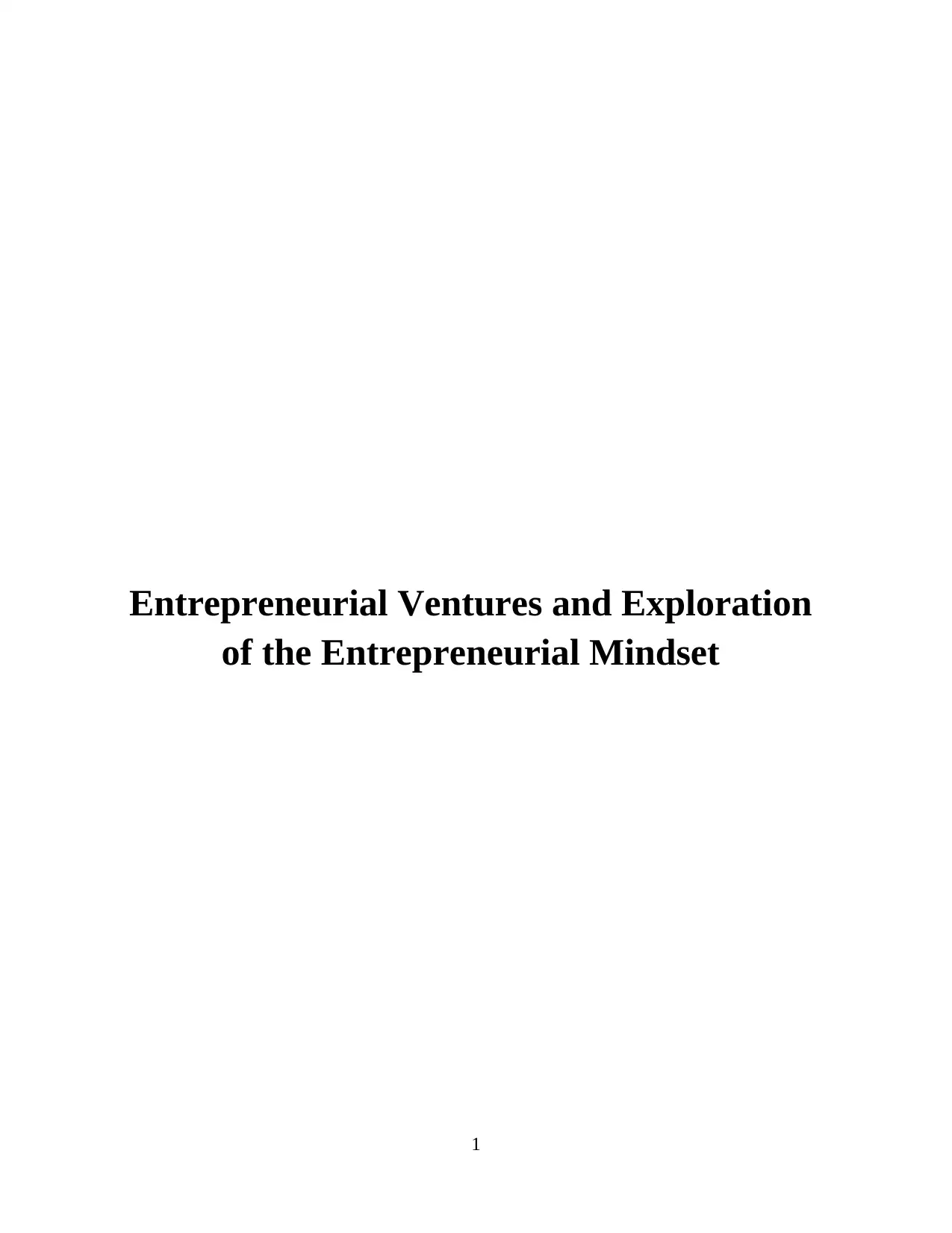
Entrepreneurial Ventures and Exploration
of the Entrepreneurial Mindset
1
of the Entrepreneurial Mindset
1
Paraphrase This Document
Need a fresh take? Get an instant paraphrase of this document with our AI Paraphraser
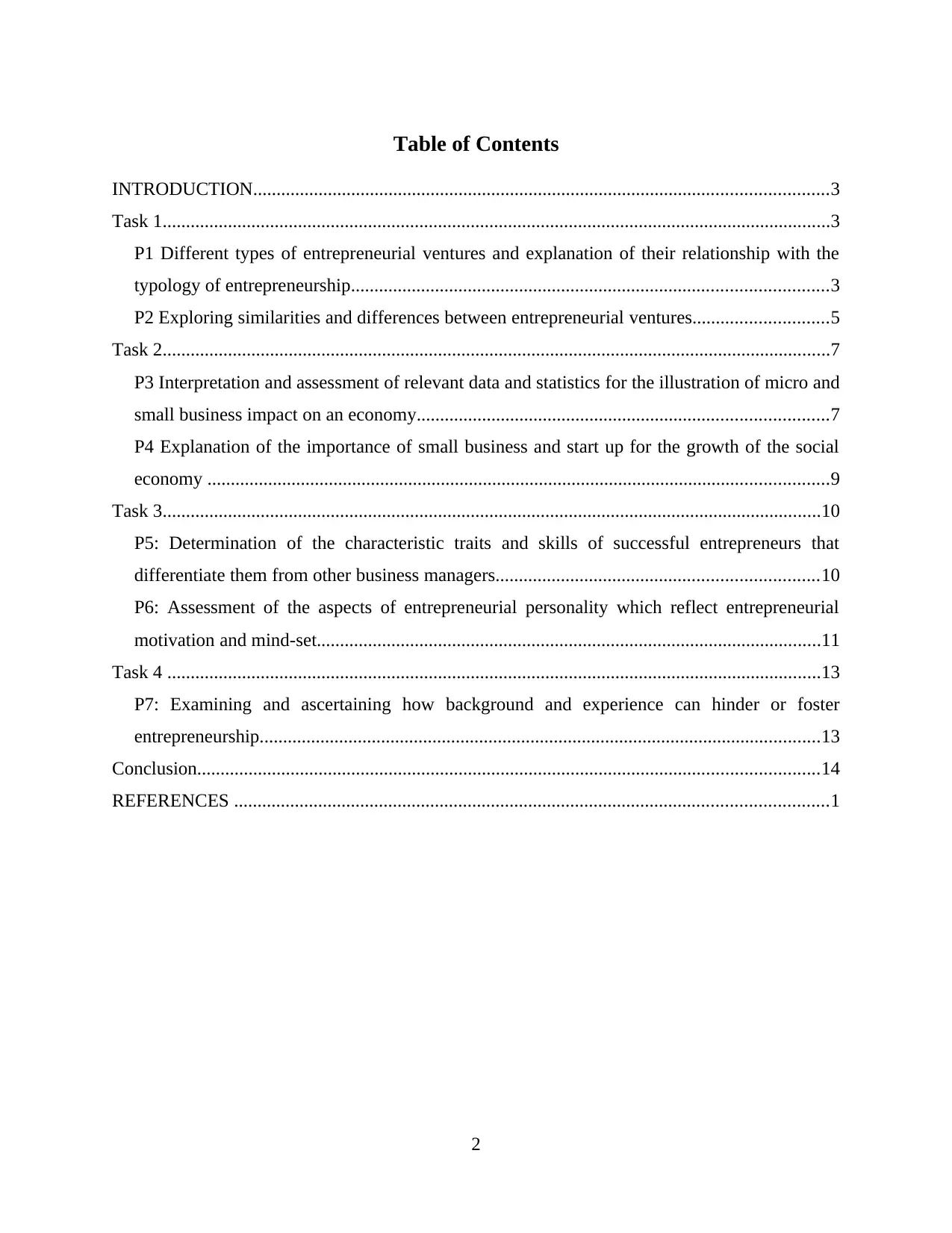
Table of Contents
INTRODUCTION...........................................................................................................................3
Task 1...............................................................................................................................................3
P1 Different types of entrepreneurial ventures and explanation of their relationship with the
typology of entrepreneurship......................................................................................................3
P2 Exploring similarities and differences between entrepreneurial ventures.............................5
Task 2...............................................................................................................................................7
P3 Interpretation and assessment of relevant data and statistics for the illustration of micro and
small business impact on an economy........................................................................................7
P4 Explanation of the importance of small business and start up for the growth of the social
economy .....................................................................................................................................9
Task 3.............................................................................................................................................10
P5: Determination of the characteristic traits and skills of successful entrepreneurs that
differentiate them from other business managers.....................................................................10
P6: Assessment of the aspects of entrepreneurial personality which reflect entrepreneurial
motivation and mind-set............................................................................................................11
Task 4 ............................................................................................................................................13
P7: Examining and ascertaining how background and experience can hinder or foster
entrepreneurship........................................................................................................................13
Conclusion.....................................................................................................................................14
REFERENCES ...............................................................................................................................1
2
INTRODUCTION...........................................................................................................................3
Task 1...............................................................................................................................................3
P1 Different types of entrepreneurial ventures and explanation of their relationship with the
typology of entrepreneurship......................................................................................................3
P2 Exploring similarities and differences between entrepreneurial ventures.............................5
Task 2...............................................................................................................................................7
P3 Interpretation and assessment of relevant data and statistics for the illustration of micro and
small business impact on an economy........................................................................................7
P4 Explanation of the importance of small business and start up for the growth of the social
economy .....................................................................................................................................9
Task 3.............................................................................................................................................10
P5: Determination of the characteristic traits and skills of successful entrepreneurs that
differentiate them from other business managers.....................................................................10
P6: Assessment of the aspects of entrepreneurial personality which reflect entrepreneurial
motivation and mind-set............................................................................................................11
Task 4 ............................................................................................................................................13
P7: Examining and ascertaining how background and experience can hinder or foster
entrepreneurship........................................................................................................................13
Conclusion.....................................................................................................................................14
REFERENCES ...............................................................................................................................1
2
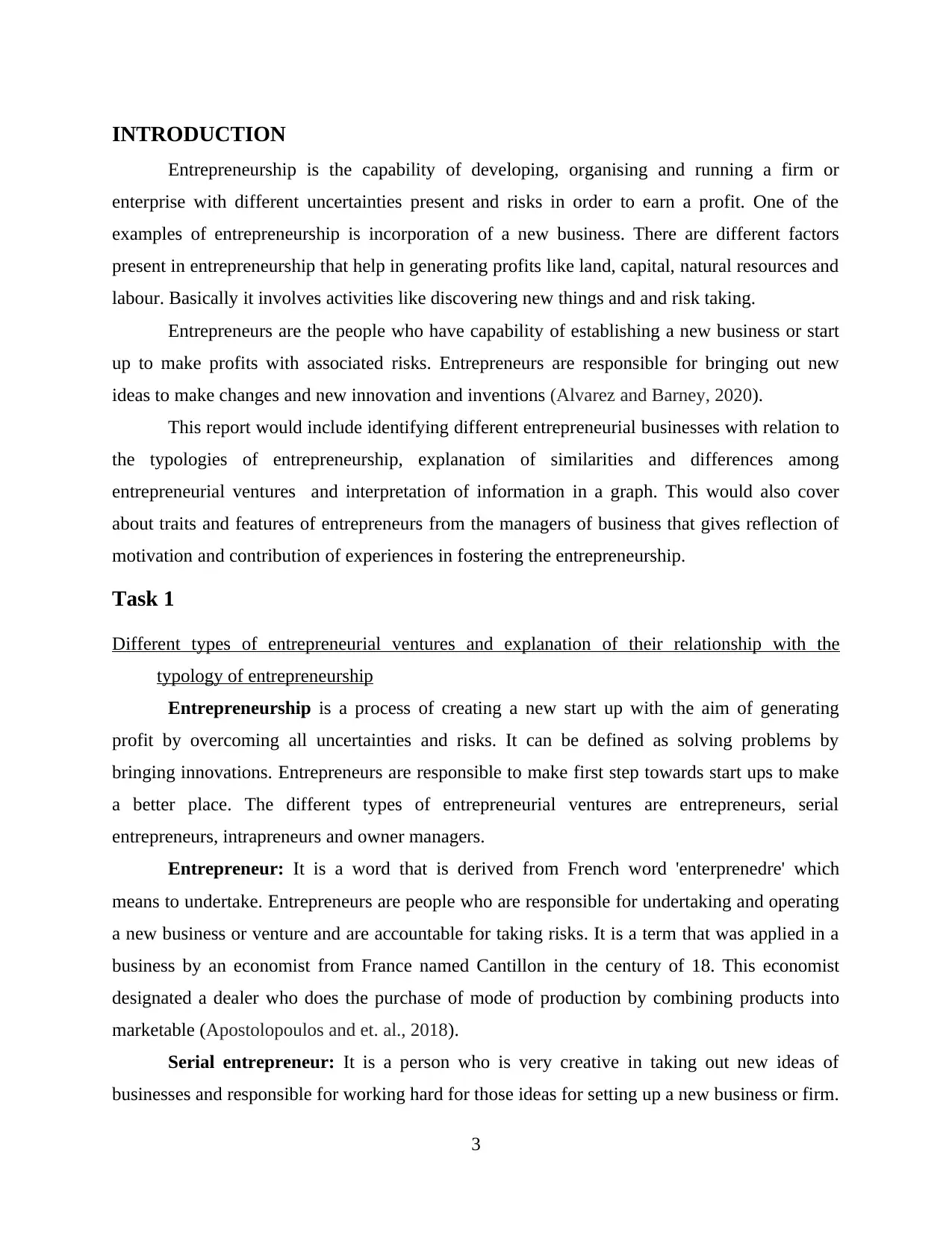
INTRODUCTION
Entrepreneurship is the capability of developing, organising and running a firm or
enterprise with different uncertainties present and risks in order to earn a profit. One of the
examples of entrepreneurship is incorporation of a new business. There are different factors
present in entrepreneurship that help in generating profits like land, capital, natural resources and
labour. Basically it involves activities like discovering new things and and risk taking.
Entrepreneurs are the people who have capability of establishing a new business or start
up to make profits with associated risks. Entrepreneurs are responsible for bringing out new
ideas to make changes and new innovation and inventions (Alvarez and Barney, 2020).
This report would include identifying different entrepreneurial businesses with relation to
the typologies of entrepreneurship, explanation of similarities and differences among
entrepreneurial ventures and interpretation of information in a graph. This would also cover
about traits and features of entrepreneurs from the managers of business that gives reflection of
motivation and contribution of experiences in fostering the entrepreneurship.
Task 1
Different types of entrepreneurial ventures and explanation of their relationship with the
typology of entrepreneurship
Entrepreneurship is a process of creating a new start up with the aim of generating
profit by overcoming all uncertainties and risks. It can be defined as solving problems by
bringing innovations. Entrepreneurs are responsible to make first step towards start ups to make
a better place. The different types of entrepreneurial ventures are entrepreneurs, serial
entrepreneurs, intrapreneurs and owner managers.
Entrepreneur: It is a word that is derived from French word 'enterprenedre' which
means to undertake. Entrepreneurs are people who are responsible for undertaking and operating
a new business or venture and are accountable for taking risks. It is a term that was applied in a
business by an economist from France named Cantillon in the century of 18. This economist
designated a dealer who does the purchase of mode of production by combining products into
marketable (Apostolopoulos and et. al., 2018).
Serial entrepreneur: It is a person who is very creative in taking out new ideas of
businesses and responsible for working hard for those ideas for setting up a new business or firm.
3
Entrepreneurship is the capability of developing, organising and running a firm or
enterprise with different uncertainties present and risks in order to earn a profit. One of the
examples of entrepreneurship is incorporation of a new business. There are different factors
present in entrepreneurship that help in generating profits like land, capital, natural resources and
labour. Basically it involves activities like discovering new things and and risk taking.
Entrepreneurs are the people who have capability of establishing a new business or start
up to make profits with associated risks. Entrepreneurs are responsible for bringing out new
ideas to make changes and new innovation and inventions (Alvarez and Barney, 2020).
This report would include identifying different entrepreneurial businesses with relation to
the typologies of entrepreneurship, explanation of similarities and differences among
entrepreneurial ventures and interpretation of information in a graph. This would also cover
about traits and features of entrepreneurs from the managers of business that gives reflection of
motivation and contribution of experiences in fostering the entrepreneurship.
Task 1
Different types of entrepreneurial ventures and explanation of their relationship with the
typology of entrepreneurship
Entrepreneurship is a process of creating a new start up with the aim of generating
profit by overcoming all uncertainties and risks. It can be defined as solving problems by
bringing innovations. Entrepreneurs are responsible to make first step towards start ups to make
a better place. The different types of entrepreneurial ventures are entrepreneurs, serial
entrepreneurs, intrapreneurs and owner managers.
Entrepreneur: It is a word that is derived from French word 'enterprenedre' which
means to undertake. Entrepreneurs are people who are responsible for undertaking and operating
a new business or venture and are accountable for taking risks. It is a term that was applied in a
business by an economist from France named Cantillon in the century of 18. This economist
designated a dealer who does the purchase of mode of production by combining products into
marketable (Apostolopoulos and et. al., 2018).
Serial entrepreneur: It is a person who is very creative in taking out new ideas of
businesses and responsible for working hard for those ideas for setting up a new business or firm.
3
⊘ This is a preview!⊘
Do you want full access?
Subscribe today to unlock all pages.

Trusted by 1+ million students worldwide
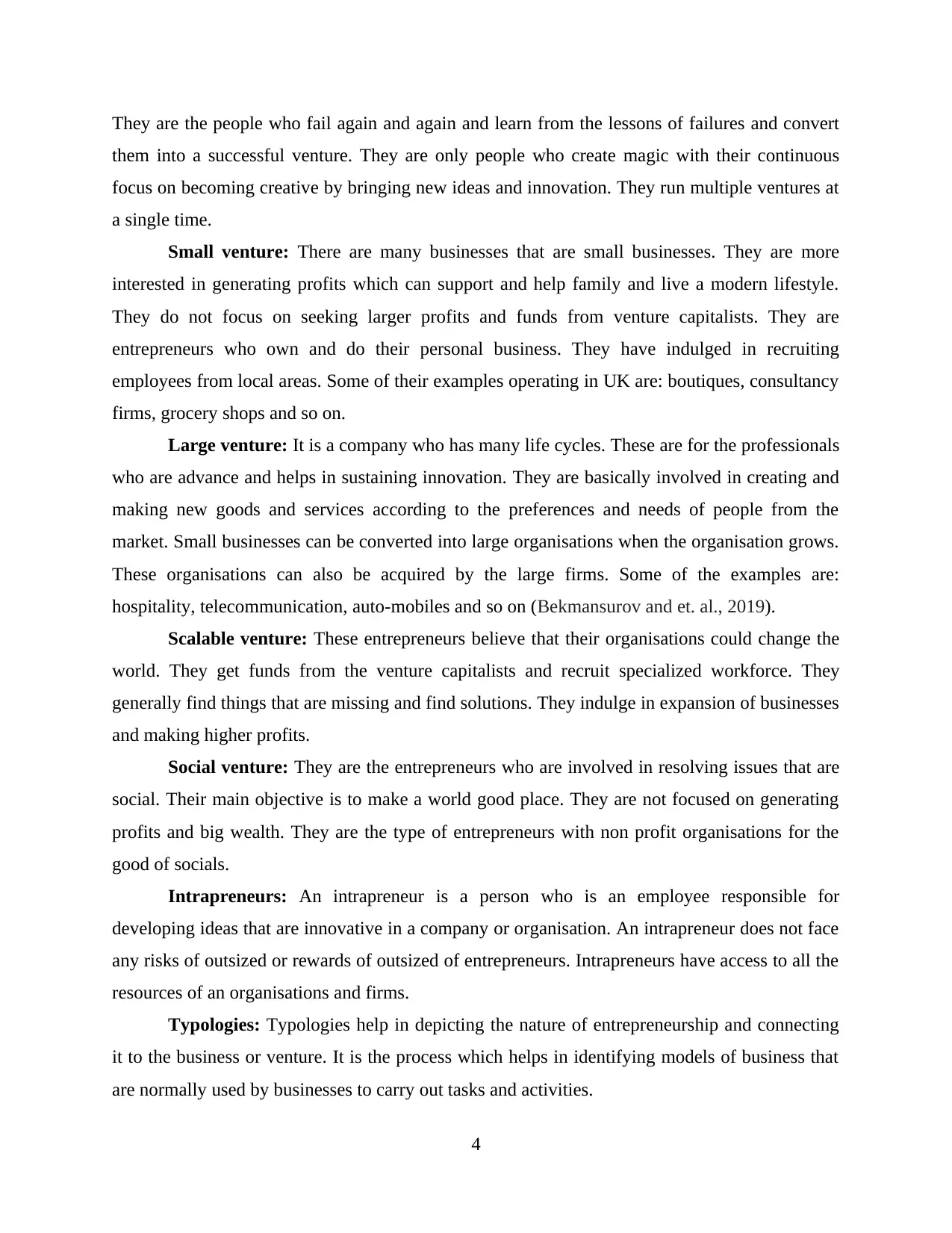
They are the people who fail again and again and learn from the lessons of failures and convert
them into a successful venture. They are only people who create magic with their continuous
focus on becoming creative by bringing new ideas and innovation. They run multiple ventures at
a single time.
Small venture: There are many businesses that are small businesses. They are more
interested in generating profits which can support and help family and live a modern lifestyle.
They do not focus on seeking larger profits and funds from venture capitalists. They are
entrepreneurs who own and do their personal business. They have indulged in recruiting
employees from local areas. Some of their examples operating in UK are: boutiques, consultancy
firms, grocery shops and so on.
Large venture: It is a company who has many life cycles. These are for the professionals
who are advance and helps in sustaining innovation. They are basically involved in creating and
making new goods and services according to the preferences and needs of people from the
market. Small businesses can be converted into large organisations when the organisation grows.
These organisations can also be acquired by the large firms. Some of the examples are:
hospitality, telecommunication, auto-mobiles and so on (Bekmansurov and et. al., 2019).
Scalable venture: These entrepreneurs believe that their organisations could change the
world. They get funds from the venture capitalists and recruit specialized workforce. They
generally find things that are missing and find solutions. They indulge in expansion of businesses
and making higher profits.
Social venture: They are the entrepreneurs who are involved in resolving issues that are
social. Their main objective is to make a world good place. They are not focused on generating
profits and big wealth. They are the type of entrepreneurs with non profit organisations for the
good of socials.
Intrapreneurs: An intrapreneur is a person who is an employee responsible for
developing ideas that are innovative in a company or organisation. An intrapreneur does not face
any risks of outsized or rewards of outsized of entrepreneurs. Intrapreneurs have access to all the
resources of an organisations and firms.
Typologies: Typologies help in depicting the nature of entrepreneurship and connecting
it to the business or venture. It is the process which helps in identifying models of business that
are normally used by businesses to carry out tasks and activities.
4
them into a successful venture. They are only people who create magic with their continuous
focus on becoming creative by bringing new ideas and innovation. They run multiple ventures at
a single time.
Small venture: There are many businesses that are small businesses. They are more
interested in generating profits which can support and help family and live a modern lifestyle.
They do not focus on seeking larger profits and funds from venture capitalists. They are
entrepreneurs who own and do their personal business. They have indulged in recruiting
employees from local areas. Some of their examples operating in UK are: boutiques, consultancy
firms, grocery shops and so on.
Large venture: It is a company who has many life cycles. These are for the professionals
who are advance and helps in sustaining innovation. They are basically involved in creating and
making new goods and services according to the preferences and needs of people from the
market. Small businesses can be converted into large organisations when the organisation grows.
These organisations can also be acquired by the large firms. Some of the examples are:
hospitality, telecommunication, auto-mobiles and so on (Bekmansurov and et. al., 2019).
Scalable venture: These entrepreneurs believe that their organisations could change the
world. They get funds from the venture capitalists and recruit specialized workforce. They
generally find things that are missing and find solutions. They indulge in expansion of businesses
and making higher profits.
Social venture: They are the entrepreneurs who are involved in resolving issues that are
social. Their main objective is to make a world good place. They are not focused on generating
profits and big wealth. They are the type of entrepreneurs with non profit organisations for the
good of socials.
Intrapreneurs: An intrapreneur is a person who is an employee responsible for
developing ideas that are innovative in a company or organisation. An intrapreneur does not face
any risks of outsized or rewards of outsized of entrepreneurs. Intrapreneurs have access to all the
resources of an organisations and firms.
Typologies: Typologies help in depicting the nature of entrepreneurship and connecting
it to the business or venture. It is the process which helps in identifying models of business that
are normally used by businesses to carry out tasks and activities.
4
Paraphrase This Document
Need a fresh take? Get an instant paraphrase of this document with our AI Paraphraser
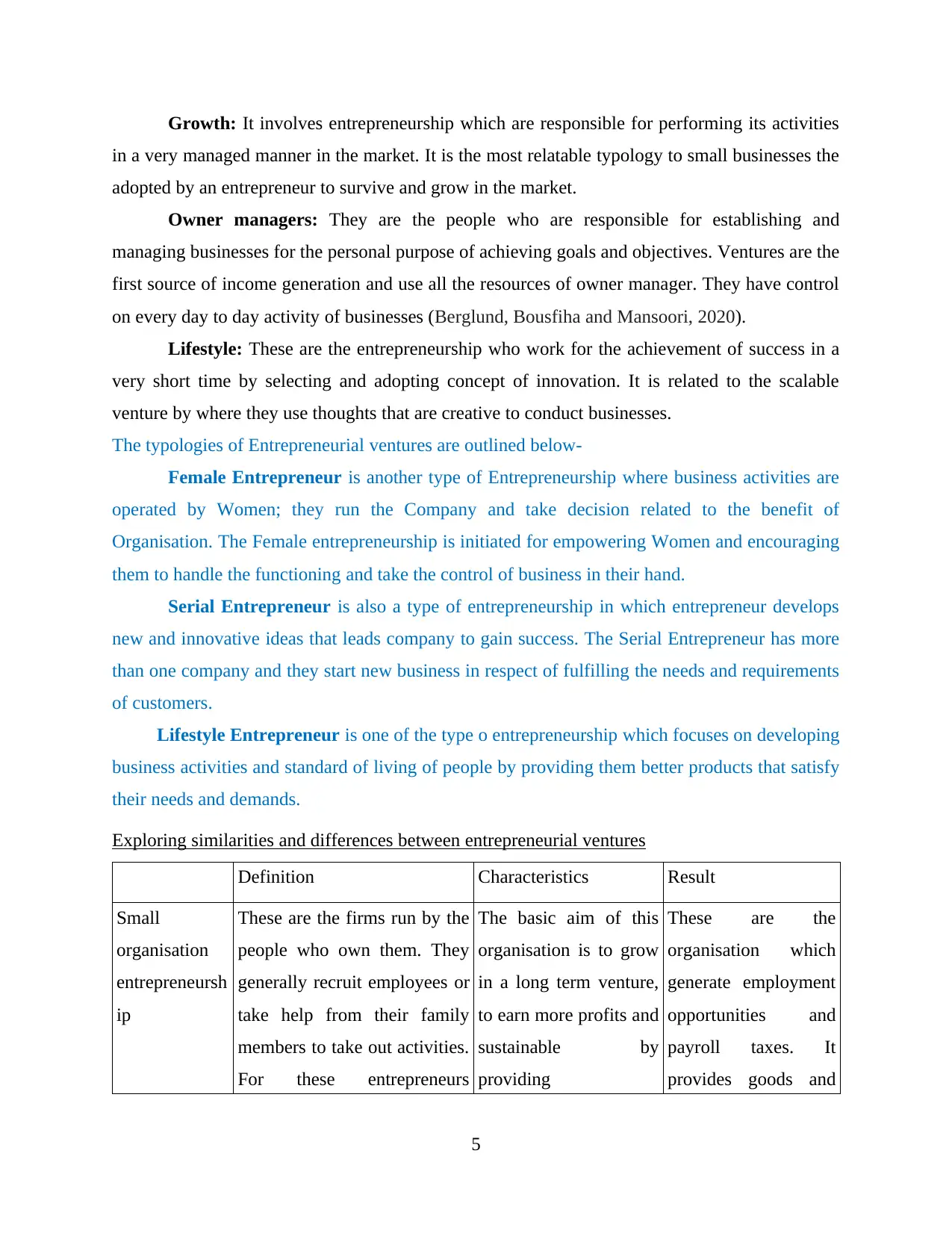
Growth: It involves entrepreneurship which are responsible for performing its activities
in a very managed manner in the market. It is the most relatable typology to small businesses the
adopted by an entrepreneur to survive and grow in the market.
Owner managers: They are the people who are responsible for establishing and
managing businesses for the personal purpose of achieving goals and objectives. Ventures are the
first source of income generation and use all the resources of owner manager. They have control
on every day to day activity of businesses (Berglund, Bousfiha and Mansoori, 2020).
Lifestyle: These are the entrepreneurship who work for the achievement of success in a
very short time by selecting and adopting concept of innovation. It is related to the scalable
venture by where they use thoughts that are creative to conduct businesses.
The typologies of Entrepreneurial ventures are outlined below-
Female Entrepreneur is another type of Entrepreneurship where business activities are
operated by Women; they run the Company and take decision related to the benefit of
Organisation. The Female entrepreneurship is initiated for empowering Women and encouraging
them to handle the functioning and take the control of business in their hand.
Serial Entrepreneur is also a type of entrepreneurship in which entrepreneur develops
new and innovative ideas that leads company to gain success. The Serial Entrepreneur has more
than one company and they start new business in respect of fulfilling the needs and requirements
of customers.
Lifestyle Entrepreneur is one of the type o entrepreneurship which focuses on developing
business activities and standard of living of people by providing them better products that satisfy
their needs and demands.
Exploring similarities and differences between entrepreneurial ventures
Definition Characteristics Result
Small
organisation
entrepreneursh
ip
These are the firms run by the
people who own them. They
generally recruit employees or
take help from their family
members to take out activities.
For these entrepreneurs
The basic aim of this
organisation is to grow
in a long term venture,
to earn more profits and
sustainable by
providing
These are the
organisation which
generate employment
opportunities and
payroll taxes. It
provides goods and
5
in a very managed manner in the market. It is the most relatable typology to small businesses the
adopted by an entrepreneur to survive and grow in the market.
Owner managers: They are the people who are responsible for establishing and
managing businesses for the personal purpose of achieving goals and objectives. Ventures are the
first source of income generation and use all the resources of owner manager. They have control
on every day to day activity of businesses (Berglund, Bousfiha and Mansoori, 2020).
Lifestyle: These are the entrepreneurship who work for the achievement of success in a
very short time by selecting and adopting concept of innovation. It is related to the scalable
venture by where they use thoughts that are creative to conduct businesses.
The typologies of Entrepreneurial ventures are outlined below-
Female Entrepreneur is another type of Entrepreneurship where business activities are
operated by Women; they run the Company and take decision related to the benefit of
Organisation. The Female entrepreneurship is initiated for empowering Women and encouraging
them to handle the functioning and take the control of business in their hand.
Serial Entrepreneur is also a type of entrepreneurship in which entrepreneur develops
new and innovative ideas that leads company to gain success. The Serial Entrepreneur has more
than one company and they start new business in respect of fulfilling the needs and requirements
of customers.
Lifestyle Entrepreneur is one of the type o entrepreneurship which focuses on developing
business activities and standard of living of people by providing them better products that satisfy
their needs and demands.
Exploring similarities and differences between entrepreneurial ventures
Definition Characteristics Result
Small
organisation
entrepreneursh
ip
These are the firms run by the
people who own them. They
generally recruit employees or
take help from their family
members to take out activities.
For these entrepreneurs
The basic aim of this
organisation is to grow
in a long term venture,
to earn more profits and
sustainable by
providing
These are the
organisation which
generate employment
opportunities and
payroll taxes. It
provides goods and
5
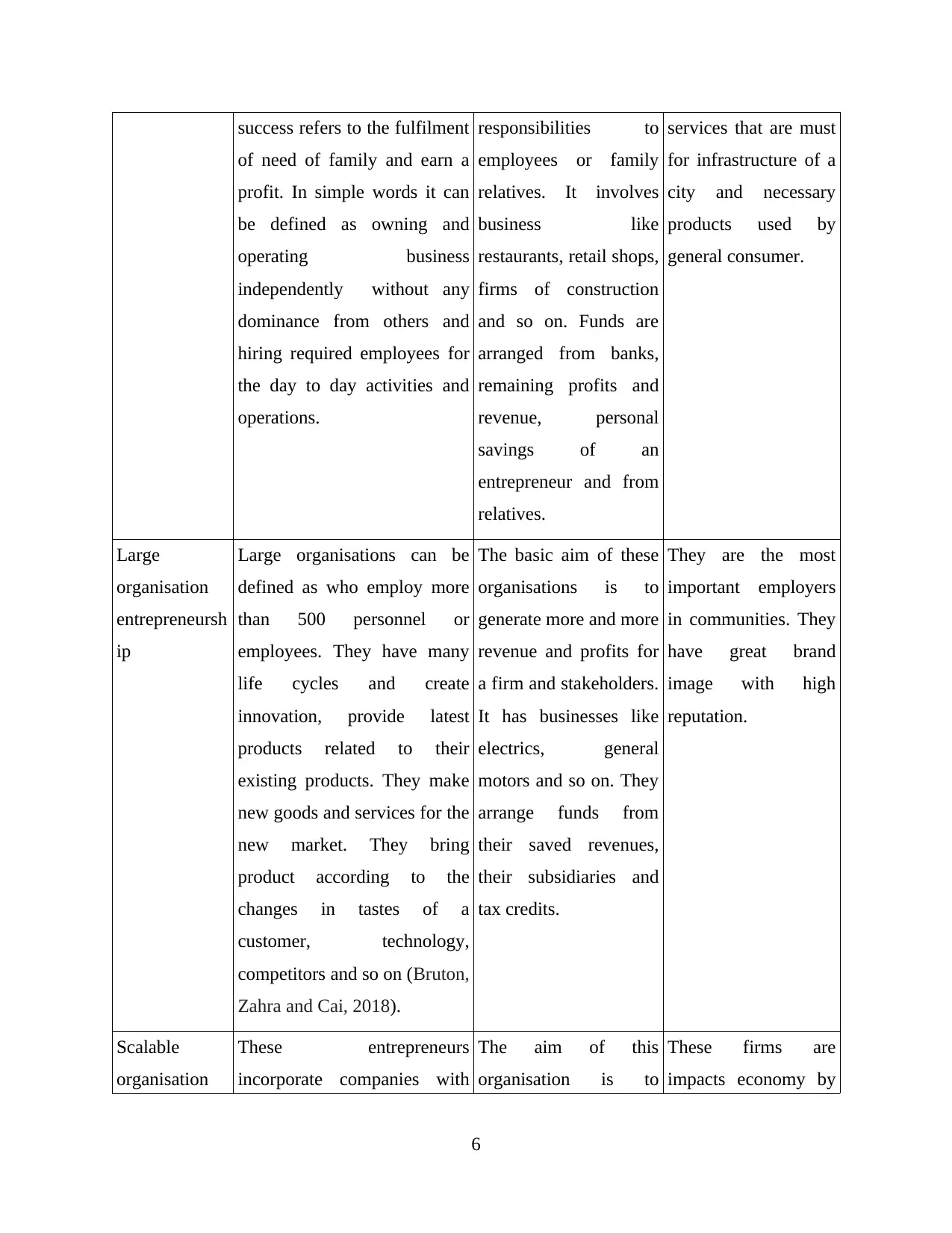
success refers to the fulfilment
of need of family and earn a
profit. In simple words it can
be defined as owning and
operating business
independently without any
dominance from others and
hiring required employees for
the day to day activities and
operations.
responsibilities to
employees or family
relatives. It involves
business like
restaurants, retail shops,
firms of construction
and so on. Funds are
arranged from banks,
remaining profits and
revenue, personal
savings of an
entrepreneur and from
relatives.
services that are must
for infrastructure of a
city and necessary
products used by
general consumer.
Large
organisation
entrepreneursh
ip
Large organisations can be
defined as who employ more
than 500 personnel or
employees. They have many
life cycles and create
innovation, provide latest
products related to their
existing products. They make
new goods and services for the
new market. They bring
product according to the
changes in tastes of a
customer, technology,
competitors and so on (Bruton,
Zahra and Cai, 2018).
The basic aim of these
organisations is to
generate more and more
revenue and profits for
a firm and stakeholders.
It has businesses like
electrics, general
motors and so on. They
arrange funds from
their saved revenues,
their subsidiaries and
tax credits.
They are the most
important employers
in communities. They
have great brand
image with high
reputation.
Scalable
organisation
These entrepreneurs
incorporate companies with
The aim of this
organisation is to
These firms are
impacts economy by
6
of need of family and earn a
profit. In simple words it can
be defined as owning and
operating business
independently without any
dominance from others and
hiring required employees for
the day to day activities and
operations.
responsibilities to
employees or family
relatives. It involves
business like
restaurants, retail shops,
firms of construction
and so on. Funds are
arranged from banks,
remaining profits and
revenue, personal
savings of an
entrepreneur and from
relatives.
services that are must
for infrastructure of a
city and necessary
products used by
general consumer.
Large
organisation
entrepreneursh
ip
Large organisations can be
defined as who employ more
than 500 personnel or
employees. They have many
life cycles and create
innovation, provide latest
products related to their
existing products. They make
new goods and services for the
new market. They bring
product according to the
changes in tastes of a
customer, technology,
competitors and so on (Bruton,
Zahra and Cai, 2018).
The basic aim of these
organisations is to
generate more and more
revenue and profits for
a firm and stakeholders.
It has businesses like
electrics, general
motors and so on. They
arrange funds from
their saved revenues,
their subsidiaries and
tax credits.
They are the most
important employers
in communities. They
have great brand
image with high
reputation.
Scalable
organisation
These entrepreneurs
incorporate companies with
The aim of this
organisation is to
These firms are
impacts economy by
6
⊘ This is a preview!⊘
Do you want full access?
Subscribe today to unlock all pages.

Trusted by 1+ million students worldwide
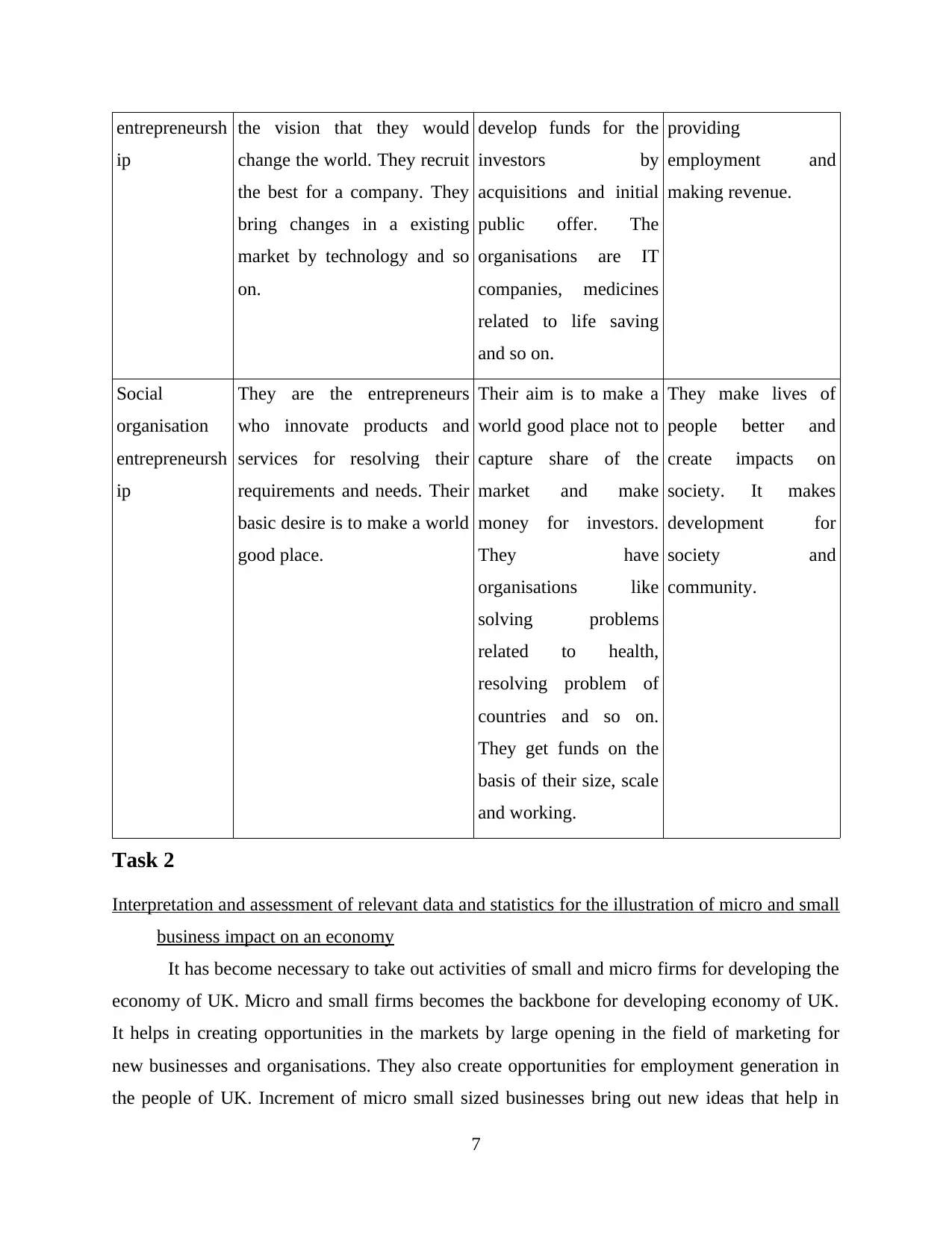
entrepreneursh
ip
the vision that they would
change the world. They recruit
the best for a company. They
bring changes in a existing
market by technology and so
on.
develop funds for the
investors by
acquisitions and initial
public offer. The
organisations are IT
companies, medicines
related to life saving
and so on.
providing
employment and
making revenue.
Social
organisation
entrepreneursh
ip
They are the entrepreneurs
who innovate products and
services for resolving their
requirements and needs. Their
basic desire is to make a world
good place.
Their aim is to make a
world good place not to
capture share of the
market and make
money for investors.
They have
organisations like
solving problems
related to health,
resolving problem of
countries and so on.
They get funds on the
basis of their size, scale
and working.
They make lives of
people better and
create impacts on
society. It makes
development for
society and
community.
Task 2
Interpretation and assessment of relevant data and statistics for the illustration of micro and small
business impact on an economy
It has become necessary to take out activities of small and micro firms for developing the
economy of UK. Micro and small firms becomes the backbone for developing economy of UK.
It helps in creating opportunities in the markets by large opening in the field of marketing for
new businesses and organisations. They also create opportunities for employment generation in
the people of UK. Increment of micro small sized businesses bring out new ideas that help in
7
ip
the vision that they would
change the world. They recruit
the best for a company. They
bring changes in a existing
market by technology and so
on.
develop funds for the
investors by
acquisitions and initial
public offer. The
organisations are IT
companies, medicines
related to life saving
and so on.
providing
employment and
making revenue.
Social
organisation
entrepreneursh
ip
They are the entrepreneurs
who innovate products and
services for resolving their
requirements and needs. Their
basic desire is to make a world
good place.
Their aim is to make a
world good place not to
capture share of the
market and make
money for investors.
They have
organisations like
solving problems
related to health,
resolving problem of
countries and so on.
They get funds on the
basis of their size, scale
and working.
They make lives of
people better and
create impacts on
society. It makes
development for
society and
community.
Task 2
Interpretation and assessment of relevant data and statistics for the illustration of micro and small
business impact on an economy
It has become necessary to take out activities of small and micro firms for developing the
economy of UK. Micro and small firms becomes the backbone for developing economy of UK.
It helps in creating opportunities in the markets by large opening in the field of marketing for
new businesses and organisations. They also create opportunities for employment generation in
the people of UK. Increment of micro small sized businesses bring out new ideas that help in
7
Paraphrase This Document
Need a fresh take? Get an instant paraphrase of this document with our AI Paraphraser
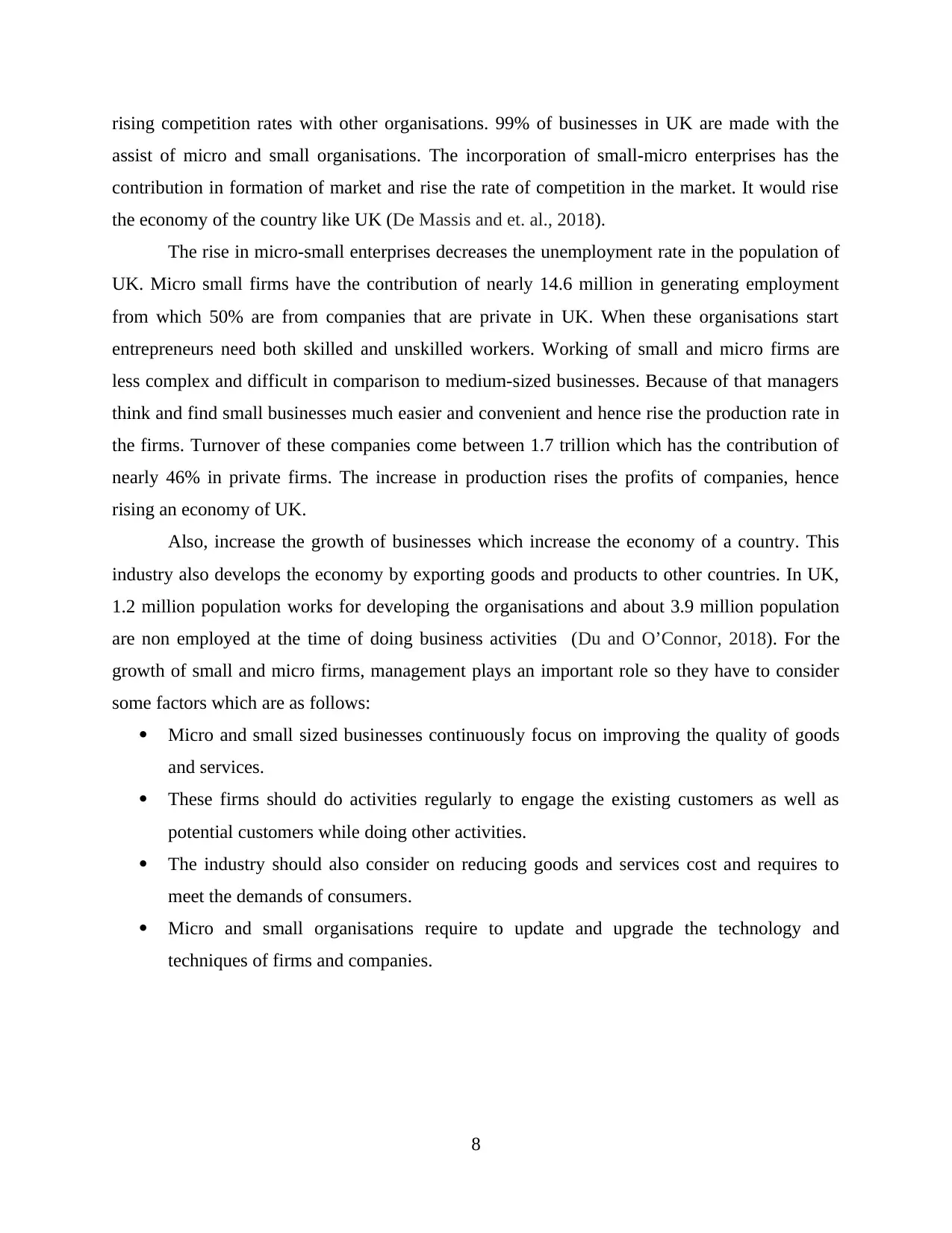
rising competition rates with other organisations. 99% of businesses in UK are made with the
assist of micro and small organisations. The incorporation of small-micro enterprises has the
contribution in formation of market and rise the rate of competition in the market. It would rise
the economy of the country like UK (De Massis and et. al., 2018).
The rise in micro-small enterprises decreases the unemployment rate in the population of
UK. Micro small firms have the contribution of nearly 14.6 million in generating employment
from which 50% are from companies that are private in UK. When these organisations start
entrepreneurs need both skilled and unskilled workers. Working of small and micro firms are
less complex and difficult in comparison to medium-sized businesses. Because of that managers
think and find small businesses much easier and convenient and hence rise the production rate in
the firms. Turnover of these companies come between 1.7 trillion which has the contribution of
nearly 46% in private firms. The increase in production rises the profits of companies, hence
rising an economy of UK.
Also, increase the growth of businesses which increase the economy of a country. This
industry also develops the economy by exporting goods and products to other countries. In UK,
1.2 million population works for developing the organisations and about 3.9 million population
are non employed at the time of doing business activities (Du and O’Connor, 2018). For the
growth of small and micro firms, management plays an important role so they have to consider
some factors which are as follows:
Micro and small sized businesses continuously focus on improving the quality of goods
and services.
These firms should do activities regularly to engage the existing customers as well as
potential customers while doing other activities.
The industry should also consider on reducing goods and services cost and requires to
meet the demands of consumers.
Micro and small organisations require to update and upgrade the technology and
techniques of firms and companies.
8
assist of micro and small organisations. The incorporation of small-micro enterprises has the
contribution in formation of market and rise the rate of competition in the market. It would rise
the economy of the country like UK (De Massis and et. al., 2018).
The rise in micro-small enterprises decreases the unemployment rate in the population of
UK. Micro small firms have the contribution of nearly 14.6 million in generating employment
from which 50% are from companies that are private in UK. When these organisations start
entrepreneurs need both skilled and unskilled workers. Working of small and micro firms are
less complex and difficult in comparison to medium-sized businesses. Because of that managers
think and find small businesses much easier and convenient and hence rise the production rate in
the firms. Turnover of these companies come between 1.7 trillion which has the contribution of
nearly 46% in private firms. The increase in production rises the profits of companies, hence
rising an economy of UK.
Also, increase the growth of businesses which increase the economy of a country. This
industry also develops the economy by exporting goods and products to other countries. In UK,
1.2 million population works for developing the organisations and about 3.9 million population
are non employed at the time of doing business activities (Du and O’Connor, 2018). For the
growth of small and micro firms, management plays an important role so they have to consider
some factors which are as follows:
Micro and small sized businesses continuously focus on improving the quality of goods
and services.
These firms should do activities regularly to engage the existing customers as well as
potential customers while doing other activities.
The industry should also consider on reducing goods and services cost and requires to
meet the demands of consumers.
Micro and small organisations require to update and upgrade the technology and
techniques of firms and companies.
8
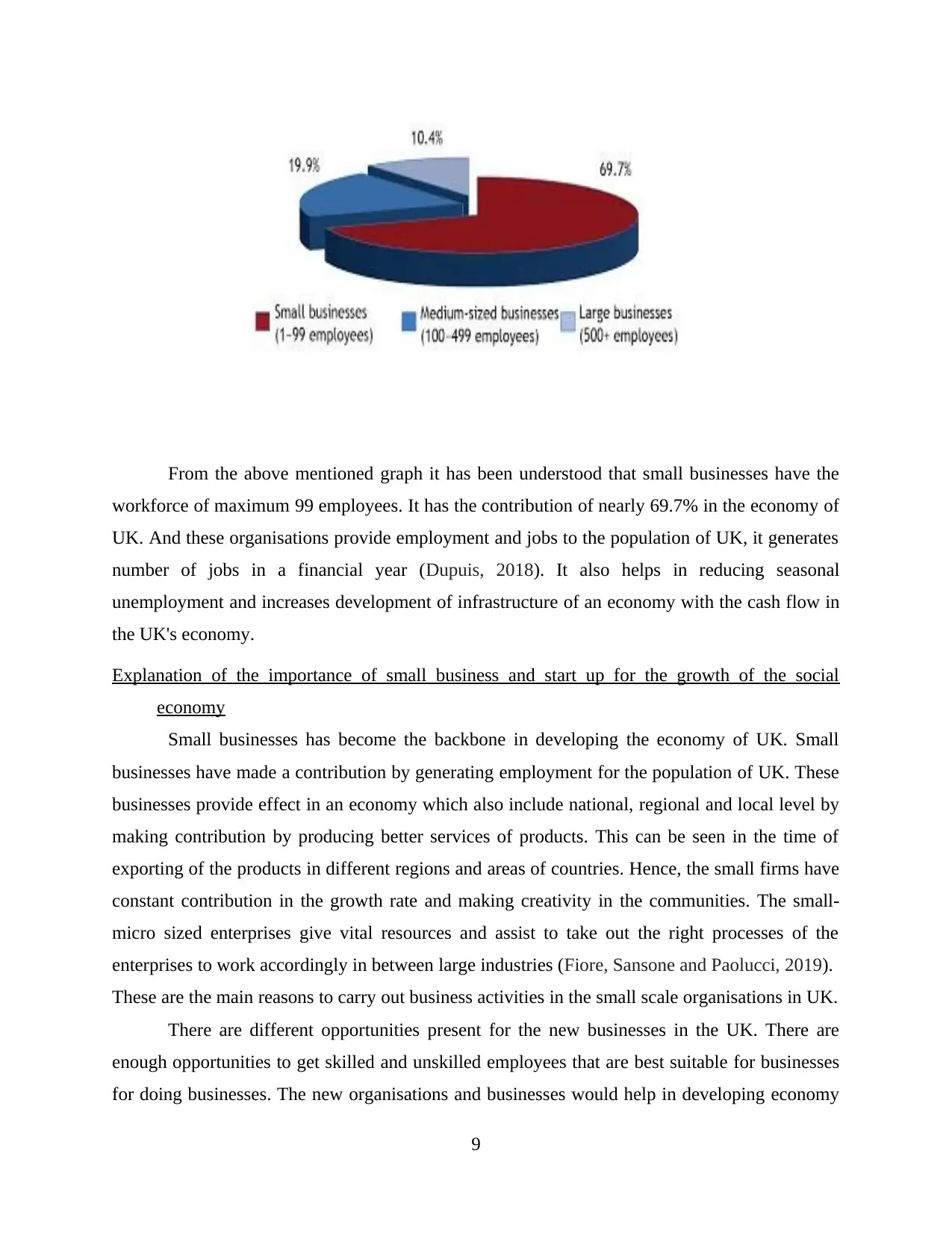
From the above mentioned graph it has been understood that small businesses have the
workforce of maximum 99 employees. It has the contribution of nearly 69.7% in the economy of
UK. And these organisations provide employment and jobs to the population of UK, it generates
number of jobs in a financial year (Dupuis, 2018). It also helps in reducing seasonal
unemployment and increases development of infrastructure of an economy with the cash flow in
the UK's economy.
Explanation of the importance of small business and start up for the growth of the social
economy
Small businesses has become the backbone in developing the economy of UK. Small
businesses have made a contribution by generating employment for the population of UK. These
businesses provide effect in an economy which also include national, regional and local level by
making contribution by producing better services of products. This can be seen in the time of
exporting of the products in different regions and areas of countries. Hence, the small firms have
constant contribution in the growth rate and making creativity in the communities. The small-
micro sized enterprises give vital resources and assist to take out the right processes of the
enterprises to work accordingly in between large industries (Fiore, Sansone and Paolucci, 2019).
These are the main reasons to carry out business activities in the small scale organisations in UK.
There are different opportunities present for the new businesses in the UK. There are
enough opportunities to get skilled and unskilled employees that are best suitable for businesses
for doing businesses. The new organisations and businesses would help in developing economy
9
workforce of maximum 99 employees. It has the contribution of nearly 69.7% in the economy of
UK. And these organisations provide employment and jobs to the population of UK, it generates
number of jobs in a financial year (Dupuis, 2018). It also helps in reducing seasonal
unemployment and increases development of infrastructure of an economy with the cash flow in
the UK's economy.
Explanation of the importance of small business and start up for the growth of the social
economy
Small businesses has become the backbone in developing the economy of UK. Small
businesses have made a contribution by generating employment for the population of UK. These
businesses provide effect in an economy which also include national, regional and local level by
making contribution by producing better services of products. This can be seen in the time of
exporting of the products in different regions and areas of countries. Hence, the small firms have
constant contribution in the growth rate and making creativity in the communities. The small-
micro sized enterprises give vital resources and assist to take out the right processes of the
enterprises to work accordingly in between large industries (Fiore, Sansone and Paolucci, 2019).
These are the main reasons to carry out business activities in the small scale organisations in UK.
There are different opportunities present for the new businesses in the UK. There are
enough opportunities to get skilled and unskilled employees that are best suitable for businesses
for doing businesses. The new organisations and businesses would help in developing economy
9
⊘ This is a preview!⊘
Do you want full access?
Subscribe today to unlock all pages.

Trusted by 1+ million students worldwide
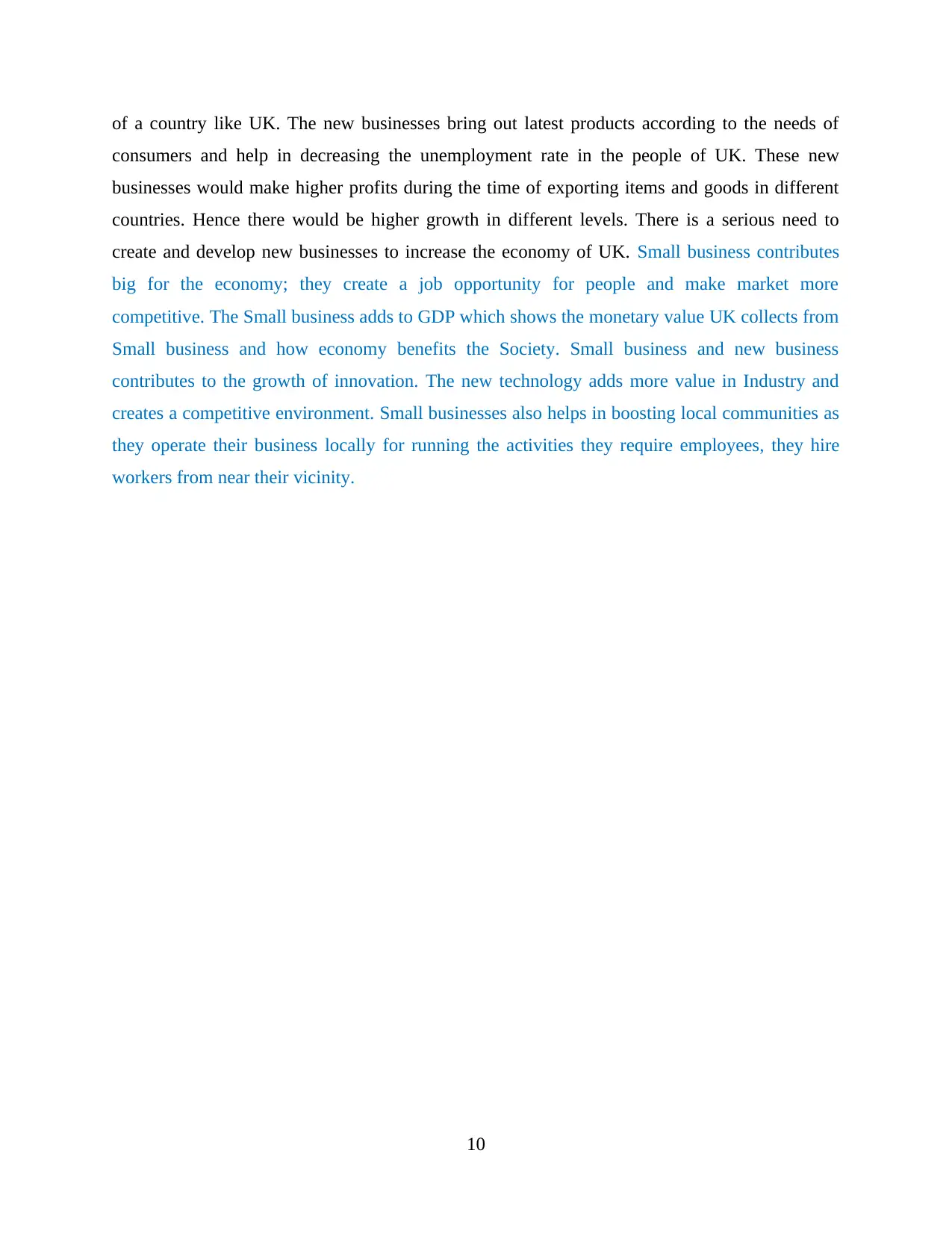
of a country like UK. The new businesses bring out latest products according to the needs of
consumers and help in decreasing the unemployment rate in the people of UK. These new
businesses would make higher profits during the time of exporting items and goods in different
countries. Hence there would be higher growth in different levels. There is a serious need to
create and develop new businesses to increase the economy of UK. Small business contributes
big for the economy; they create a job opportunity for people and make market more
competitive. The Small business adds to GDP which shows the monetary value UK collects from
Small business and how economy benefits the Society. Small business and new business
contributes to the growth of innovation. The new technology adds more value in Industry and
creates a competitive environment. Small businesses also helps in boosting local communities as
they operate their business locally for running the activities they require employees, they hire
workers from near their vicinity.
10
consumers and help in decreasing the unemployment rate in the people of UK. These new
businesses would make higher profits during the time of exporting items and goods in different
countries. Hence there would be higher growth in different levels. There is a serious need to
create and develop new businesses to increase the economy of UK. Small business contributes
big for the economy; they create a job opportunity for people and make market more
competitive. The Small business adds to GDP which shows the monetary value UK collects from
Small business and how economy benefits the Society. Small business and new business
contributes to the growth of innovation. The new technology adds more value in Industry and
creates a competitive environment. Small businesses also helps in boosting local communities as
they operate their business locally for running the activities they require employees, they hire
workers from near their vicinity.
10
Paraphrase This Document
Need a fresh take? Get an instant paraphrase of this document with our AI Paraphraser
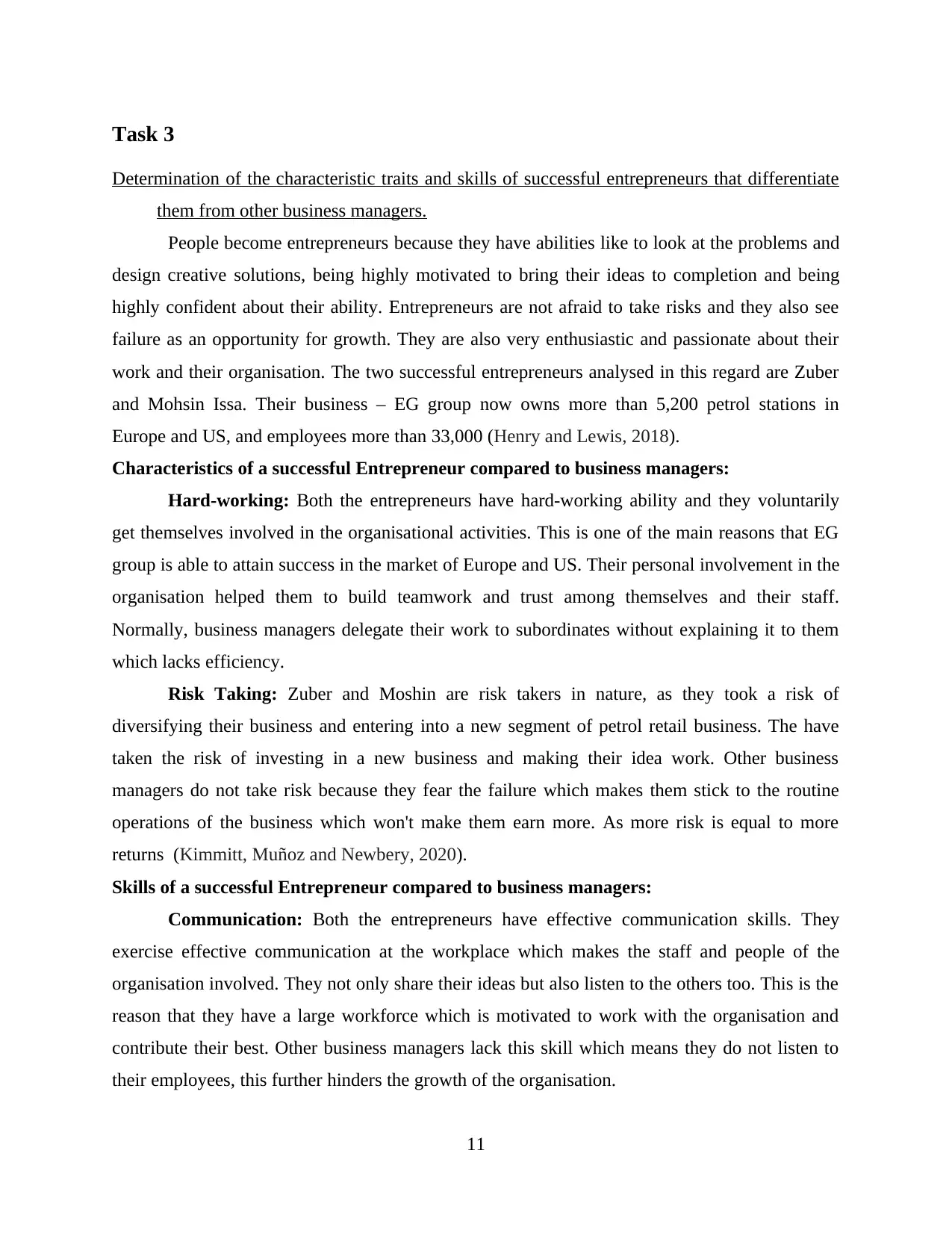
Task 3
Determination of the characteristic traits and skills of successful entrepreneurs that differentiate
them from other business managers.
People become entrepreneurs because they have abilities like to look at the problems and
design creative solutions, being highly motivated to bring their ideas to completion and being
highly confident about their ability. Entrepreneurs are not afraid to take risks and they also see
failure as an opportunity for growth. They are also very enthusiastic and passionate about their
work and their organisation. The two successful entrepreneurs analysed in this regard are Zuber
and Mohsin Issa. Their business – EG group now owns more than 5,200 petrol stations in
Europe and US, and employees more than 33,000 (Henry and Lewis, 2018).
Characteristics of a successful Entrepreneur compared to business managers:
Hard-working: Both the entrepreneurs have hard-working ability and they voluntarily
get themselves involved in the organisational activities. This is one of the main reasons that EG
group is able to attain success in the market of Europe and US. Their personal involvement in the
organisation helped them to build teamwork and trust among themselves and their staff.
Normally, business managers delegate their work to subordinates without explaining it to them
which lacks efficiency.
Risk Taking: Zuber and Moshin are risk takers in nature, as they took a risk of
diversifying their business and entering into a new segment of petrol retail business. The have
taken the risk of investing in a new business and making their idea work. Other business
managers do not take risk because they fear the failure which makes them stick to the routine
operations of the business which won't make them earn more. As more risk is equal to more
returns (Kimmitt, Muñoz and Newbery, 2020).
Skills of a successful Entrepreneur compared to business managers:
Communication: Both the entrepreneurs have effective communication skills. They
exercise effective communication at the workplace which makes the staff and people of the
organisation involved. They not only share their ideas but also listen to the others too. This is the
reason that they have a large workforce which is motivated to work with the organisation and
contribute their best. Other business managers lack this skill which means they do not listen to
their employees, this further hinders the growth of the organisation.
11
Determination of the characteristic traits and skills of successful entrepreneurs that differentiate
them from other business managers.
People become entrepreneurs because they have abilities like to look at the problems and
design creative solutions, being highly motivated to bring their ideas to completion and being
highly confident about their ability. Entrepreneurs are not afraid to take risks and they also see
failure as an opportunity for growth. They are also very enthusiastic and passionate about their
work and their organisation. The two successful entrepreneurs analysed in this regard are Zuber
and Mohsin Issa. Their business – EG group now owns more than 5,200 petrol stations in
Europe and US, and employees more than 33,000 (Henry and Lewis, 2018).
Characteristics of a successful Entrepreneur compared to business managers:
Hard-working: Both the entrepreneurs have hard-working ability and they voluntarily
get themselves involved in the organisational activities. This is one of the main reasons that EG
group is able to attain success in the market of Europe and US. Their personal involvement in the
organisation helped them to build teamwork and trust among themselves and their staff.
Normally, business managers delegate their work to subordinates without explaining it to them
which lacks efficiency.
Risk Taking: Zuber and Moshin are risk takers in nature, as they took a risk of
diversifying their business and entering into a new segment of petrol retail business. The have
taken the risk of investing in a new business and making their idea work. Other business
managers do not take risk because they fear the failure which makes them stick to the routine
operations of the business which won't make them earn more. As more risk is equal to more
returns (Kimmitt, Muñoz and Newbery, 2020).
Skills of a successful Entrepreneur compared to business managers:
Communication: Both the entrepreneurs have effective communication skills. They
exercise effective communication at the workplace which makes the staff and people of the
organisation involved. They not only share their ideas but also listen to the others too. This is the
reason that they have a large workforce which is motivated to work with the organisation and
contribute their best. Other business managers lack this skill which means they do not listen to
their employees, this further hinders the growth of the organisation.
11
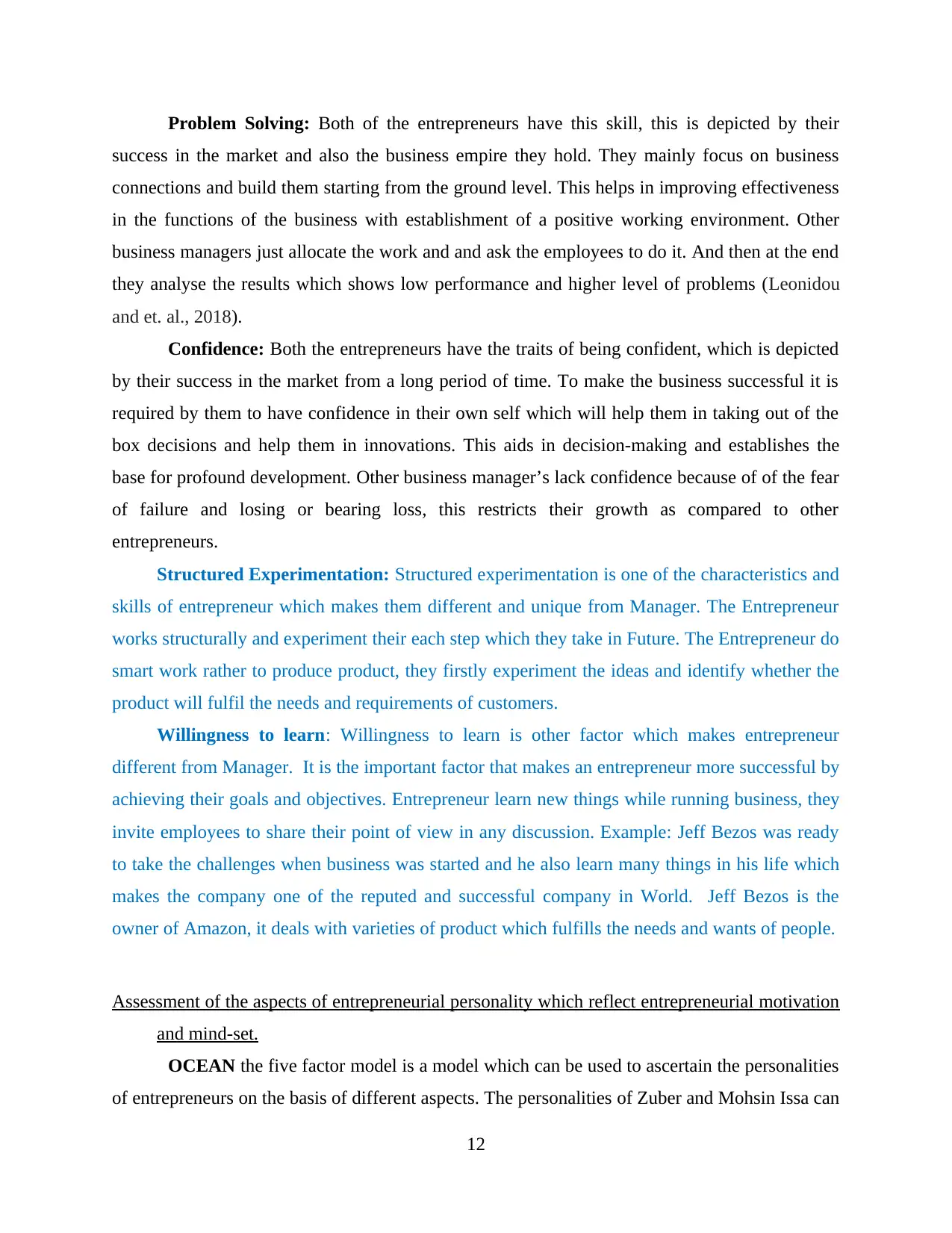
Problem Solving: Both of the entrepreneurs have this skill, this is depicted by their
success in the market and also the business empire they hold. They mainly focus on business
connections and build them starting from the ground level. This helps in improving effectiveness
in the functions of the business with establishment of a positive working environment. Other
business managers just allocate the work and and ask the employees to do it. And then at the end
they analyse the results which shows low performance and higher level of problems (Leonidou
and et. al., 2018).
Confidence: Both the entrepreneurs have the traits of being confident, which is depicted
by their success in the market from a long period of time. To make the business successful it is
required by them to have confidence in their own self which will help them in taking out of the
box decisions and help them in innovations. This aids in decision-making and establishes the
base for profound development. Other business manager’s lack confidence because of of the fear
of failure and losing or bearing loss, this restricts their growth as compared to other
entrepreneurs.
Structured Experimentation: Structured experimentation is one of the characteristics and
skills of entrepreneur which makes them different and unique from Manager. The Entrepreneur
works structurally and experiment their each step which they take in Future. The Entrepreneur do
smart work rather to produce product, they firstly experiment the ideas and identify whether the
product will fulfil the needs and requirements of customers.
Willingness to learn: Willingness to learn is other factor which makes entrepreneur
different from Manager. It is the important factor that makes an entrepreneur more successful by
achieving their goals and objectives. Entrepreneur learn new things while running business, they
invite employees to share their point of view in any discussion. Example: Jeff Bezos was ready
to take the challenges when business was started and he also learn many things in his life which
makes the company one of the reputed and successful company in World. Jeff Bezos is the
owner of Amazon, it deals with varieties of product which fulfills the needs and wants of people.
Assessment of the aspects of entrepreneurial personality which reflect entrepreneurial motivation
and mind-set.
OCEAN the five factor model is a model which can be used to ascertain the personalities
of entrepreneurs on the basis of different aspects. The personalities of Zuber and Mohsin Issa can
12
success in the market and also the business empire they hold. They mainly focus on business
connections and build them starting from the ground level. This helps in improving effectiveness
in the functions of the business with establishment of a positive working environment. Other
business managers just allocate the work and and ask the employees to do it. And then at the end
they analyse the results which shows low performance and higher level of problems (Leonidou
and et. al., 2018).
Confidence: Both the entrepreneurs have the traits of being confident, which is depicted
by their success in the market from a long period of time. To make the business successful it is
required by them to have confidence in their own self which will help them in taking out of the
box decisions and help them in innovations. This aids in decision-making and establishes the
base for profound development. Other business manager’s lack confidence because of of the fear
of failure and losing or bearing loss, this restricts their growth as compared to other
entrepreneurs.
Structured Experimentation: Structured experimentation is one of the characteristics and
skills of entrepreneur which makes them different and unique from Manager. The Entrepreneur
works structurally and experiment their each step which they take in Future. The Entrepreneur do
smart work rather to produce product, they firstly experiment the ideas and identify whether the
product will fulfil the needs and requirements of customers.
Willingness to learn: Willingness to learn is other factor which makes entrepreneur
different from Manager. It is the important factor that makes an entrepreneur more successful by
achieving their goals and objectives. Entrepreneur learn new things while running business, they
invite employees to share their point of view in any discussion. Example: Jeff Bezos was ready
to take the challenges when business was started and he also learn many things in his life which
makes the company one of the reputed and successful company in World. Jeff Bezos is the
owner of Amazon, it deals with varieties of product which fulfills the needs and wants of people.
Assessment of the aspects of entrepreneurial personality which reflect entrepreneurial motivation
and mind-set.
OCEAN the five factor model is a model which can be used to ascertain the personalities
of entrepreneurs on the basis of different aspects. The personalities of Zuber and Mohsin Issa can
12
⊘ This is a preview!⊘
Do you want full access?
Subscribe today to unlock all pages.

Trusted by 1+ million students worldwide
1 out of 17
Related Documents
Your All-in-One AI-Powered Toolkit for Academic Success.
+13062052269
info@desklib.com
Available 24*7 on WhatsApp / Email
![[object Object]](/_next/static/media/star-bottom.7253800d.svg)
Unlock your academic potential
Copyright © 2020–2026 A2Z Services. All Rights Reserved. Developed and managed by ZUCOL.





